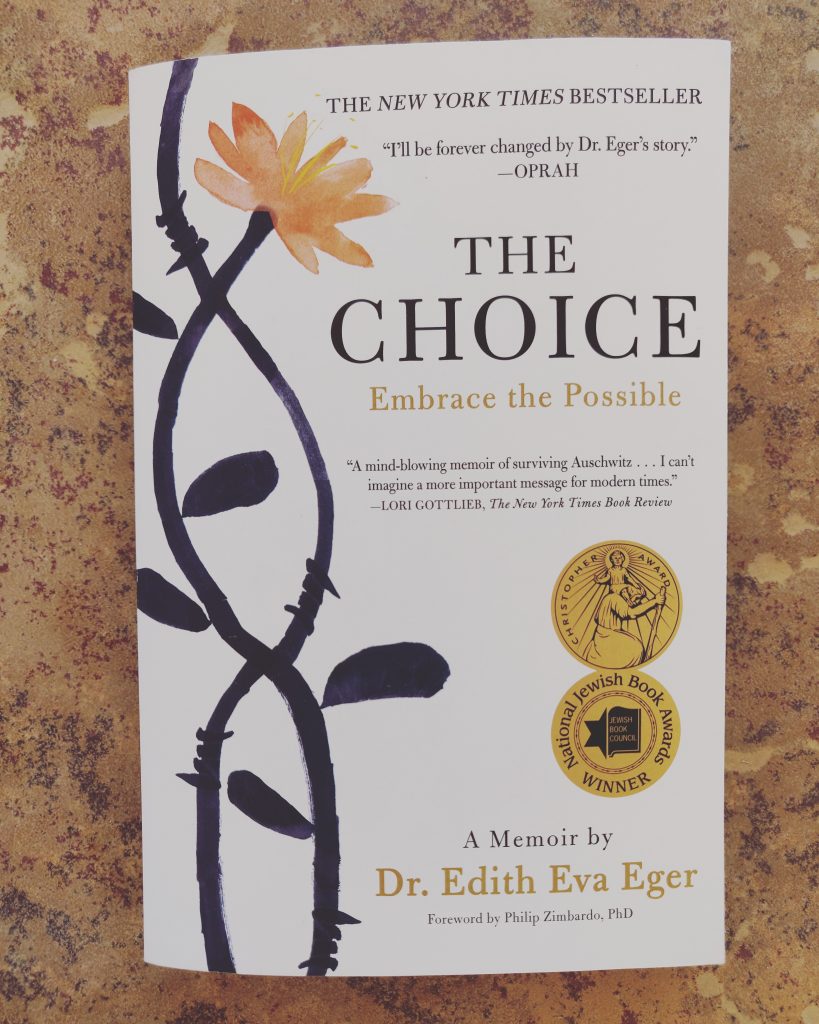“Our painful experiences aren’t a liability–they’re a gift. They give us perspective and meaning, an opportunity to find our unique purpose and our strength.” -Dr. Edith Eger
I recently finished reading The Choice, a book full of hope and inspiration. Dr. Edith Eger, the author, shares her story of surviving Auschwitz. Although she suffers so many losses, she holds onto her hope. Eventually, Dr. Eger becomes a licensed clinical psychologist. Through her work with others, she also works on her own healing from her horrific experiences at Auschwitz. She teaches us how we can forgive and how we can free ourselves in the process. As I was reading The Choice, I kept thinking about how some of the most powerful lessons from the book can help stepmoms.

Three Lessons from The Choice
1. We can’t compare our suffering to someone else’s suffering.
Dr. Eger explains, “There’s nothing that makes my pain worse or better than yours, no graph on which we can plot the relative importance of one sorrow versus another. People say to me, ‘Things in my life are pretty hard right now, but I have no right to complain–it’s not Auschwitz.’ This kind of comparison can lead us to minimize or diminish our own suffering. If we discount our pain, or punish ourselves for feeling lost or isolated or scared about the challenges in our lives, however insignificant these challenges may seem to someone else, then we’re still choosing to be victims. We’re not seeing our choices. I want you to hear my story and say, ‘If she can do it, so can I!’”
I think we are all guilty of this kind of thinking from time to time. As stepmoms, we may be having custody issues or problems with sending clothes back and forth between households, but we think to ourselves, “This is nothing compared to what other people are going through. Other people have children who are sick or they may not be able to have children. I should just be thankful for what I have.” These thoughts are common, but they are so destructive! When you judge yourself and repress your feelings, you aren’t allowing yourself to work through the pain. This can even lead to a more complicated form of grief called disenfranchised grief.
2. All of us have choices to create the kind of life we want to have.
Dr. Eger emphasizes that to truly be free, we need to live in the present. If we are constantly living in the past and rehashing our regrets, we are in “a prison of our making.” The same problem can happen if we are constantly looking forward to the future. “ I will be happy when…” That’s why it’s crucial for us to exercise our choices in the present.
As stepmoms, many things are outside of our control–the custody schedule, what goes on in the other household, and even parenting decisions within our own household. However, our power lies in our choice to focus on what is within our control. We can set healthy boundaries around what we are willing to do, and we can voice our boundaries in a constructive way.
3. Through forgiveness, we can set ourselves free.
This is an extremely powerful idea, and it is also very difficult. How can we forgive someone, especially if they don’t express regret or apologize to us? Dr. Eger explores this idea through her own experience with anger towards Hitler. She shares, “As long as I was holding onto that rage, I was in chains with him, locked in the damaging past, locked in my own grief. To forgive is to grieve–for what happened, for what didn’t happen–and to give up the need for a different past.” Sometimes, we forgive FOR ourselves because by carrying around that anger, we’re only hurting ourselves.
This is important for us as stepmoms because it is easy to be caught in an unhealthy cycle of anger towards our stepchildren’s mom, especially if she is a high-conflict individual. However, eventually, we have to ask ourselves, who are we hurting by holding onto this rage or this grudge?
A Challenge to Do Better
Overall, Dr. Eger challenged some of the stories I tell myself about what I can and can’t do as a stepmom, as a wife, and as a person. The truth is we have the freedom to choose what we do with our lives. Dr. Eger is the perfect example–she wrote this book when she was 90 years old, and this is her first book! How amazing is that? If you’re looking for some hope during these chaotic times, I highly recommend The Choice. You can read more about Dr. Eger and order her books here.
I would love to hear your thoughts about the book. What did you take away from Dr. Eger’s story? How did it challenge you?
